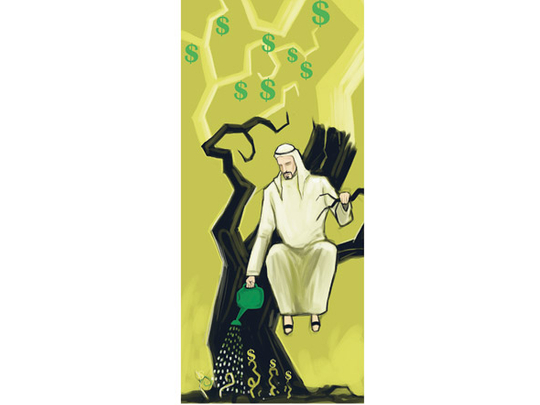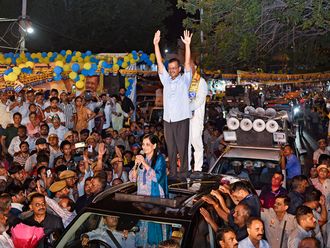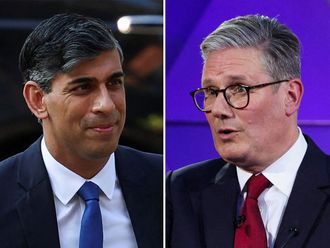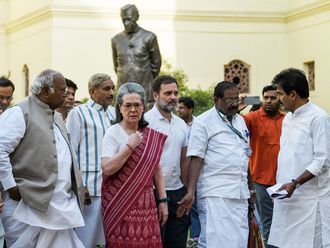
Almost 18 months after the "Lehman-handling" of the global economy in September 2008, which subsequently hit the UAE like a financial tsunami, the dust appears to be settling.
The UAE as a federation emerged stronger. The experience will be a catalyst that will help the union tackle similar or worse crises in the future.
Well, there's a whole lot of dust. For Dubai it has come down from $80 billion (Dh 293.6 billion) in 2008 to a mere $23.5 billion this month following a series of restructuring across the government's various holding companies.
Following a period of chaos in which most industry stakeholders remained in a state of denial, the government officials finally got to the bottom of it — or so it appears.
Job cuts and salary cuts have become a thing of the past, well almost. However, due to the slowdown in business activities, cash flow remains well below expectations for many small and medium enterprises. As a result, financial stress is making it difficult for many businesses to sustain themselves.
In many ways the UAE Government's response to the crisis was prompt and adequate. The UAE Central Bank and Ministry of Fin-ance had, in 2008, created two separate liquidity facilities, collectively amounting to Dh120 billion. The Abu Dhabi Government also pumped in Dh16 billion to recapitalise its five banks.
However, the major players in real estate — the worst-hit sector — were not prepared for such mayhem. Most companies actually started to realise the impact only when their cash flow began to dwindle.
The government had also withdrawn two mortgage lenders — Amlak and Tamweel — from the market when the buyers needed them the most. This compounded the problems as end-users remained out of the real estate game.
For Dubai World the experience was totally different. When the crisis hit the Gulf the company was in the middle of a major project planning and development phase. It had far more projects in the planning stage than those that were completed and those still under construction put together.
By the end of 2008 the biggest UAE holding company had liabilities to the tune of $59 billion, higher than the emirate's GDP. It was caught off-guard, as it had too much exposure.
However, the same could be said about hundreds of other developers, brokers and those involved in the real estate supply chain.
So Dubai World had to enter into a financial re-engineering phase, which had begun in early 2009.
As a result, by November last year, its problems were reduced to $26 billion, when the conglomerate sent an SOS requesting a standstill.
By this time, Dubai had successfully secured $20 billion through a bond programme, equally subscribed by the UAE Central Bank and Abu Dhabi Government. It has helped Dubai to repay some of its outstanding loans and sukuks.
Last week's $23.5 billion debt restructuring proposal put forward by the Dubai Government to creditors of Dubai World is another good example that shows that the industry stakeholders have finally realised the ground realities.
Under the proposal, the Dubai Government has agreed to pump $9.5 billion into Dubai World's coffers and help it continue activities with a new business plan that will enable it to repay the remaining $14.2 billion in debt, owed to the creditors in full and over an extended period of five to eight years.
This is one of the best viable proposals, under the given circumstances, that could end the standstill requested by Dubai World last November.
The proposal, if accepted by creditors, will help both Dubai World and Nakheel gain lost ground. It will help Dubai return to growth — depending on the pace of the global recovery and the return of foreign capital.
"There is a clear change of tone which implies that Dubai is again moving to a position of strength as the global economy … is improving," said Baldwin Berges, Managing Director of UK-based Silk Invest Limited. "It will allow for more people to again believe in Dubai's prodigious future." Although Dubai's encounter with the global economic crisis is far from over, the emirate appears to have won the first battle, if not the war. The International Monetary Fund (IMF) has also backed the Dubai Government's proposal for its "intention to find a fair and equitable solution for all stakeholders".
Lessons learnt
The financial crisis has taught the corporations many lessons. First: Over-leveraging could prove costly if it is not in line with the ground realities. Second: Whatever you build, make sure it sells.
Third: Don't bite off more than you can chew.
Nevertheless, the financial downturn has brought the UAE as a country, which has historically been a loose federation, much closer. As a nation, the federation's fabric has become much stronger to be able to withstand much bigger shocks and challenges in the future.
As Shaikh Ahmad Bin Saeed Al Maktoum, Chairman of the Dubai Supreme Fiscal Committee, said, "The Government of Dubai is taking decisive action to address the challenges related to the global economic crisis and to build the foundation for a strong balanced future growth. This period has demonstrated the unity and shared purpose of the UAE."


_resources1_16a3106e66e_small.jpg)





